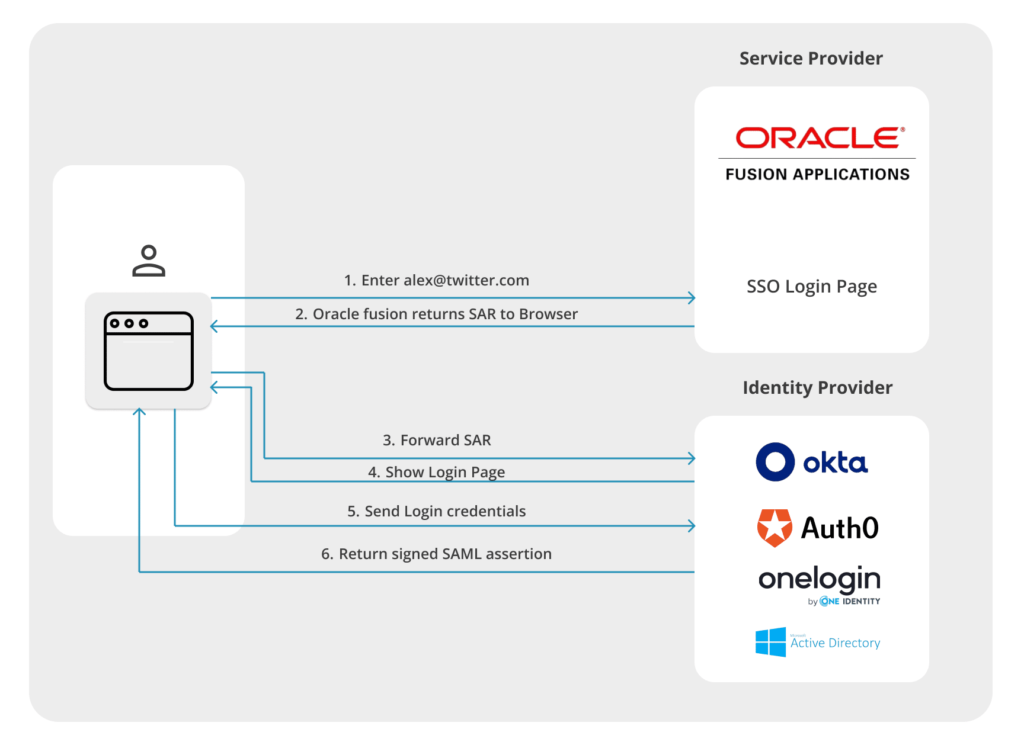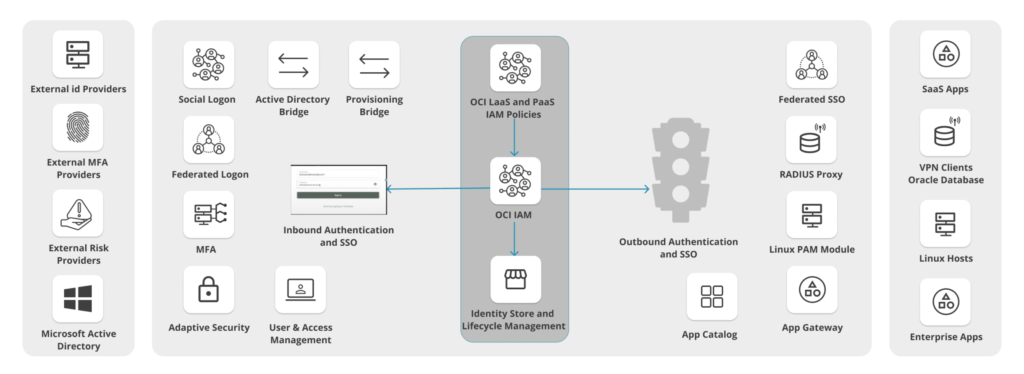SSO with
Oracle Fusion and IDCS
The security, user experience, IT management, and compliance benefits of integrating SSO with Oracle Fusion Applications and IDCS are substantial.
What is Single Sign-On (SSO)?
A user can access numerous apps or services using a single set of login credentials (such as a username and password) thanks to the Single Sign-On (SSO) authentication mechanism. As a result, a user only needs to log in once to access linked applications and services after logging in to one.
Single Sign-On (SSO)

Oracle OCI Identity Domain

IDCS (formerly OCI IAM) SSO Setup Types
- OCI IAM will supply the services, while Fusion will serve as the identity provider.
- OCI IAM will serve as the identity provider and Oracle Fusion as the service provider.
What is the purpose of integrating SSO with IDCS and Oracle Fusion?
A number of advantages that improve security, optimize user experience, and simplify IT management are provided by integrating Single Sign-On (SSO) with Oracle Fusion Applications and Oracle Identity Cloud Service (IDCS). The main justifications for combining SSO with IDCS and Fusion are as follows:
1. Strengthened Defense
Centralized Authentication:
- Through SSO integration, IDCS is able to handle authentication centrally, lowering the risk of security breaches by enforcing uniform security policies across all apps.
Extra Security Functions:
- Advanced security features like risk-based authentication, adaptive security measures, and multi-factor authentication (MFA) are offered by IDCS. Oracle Fusion Applications’ security posture is greatly improved by these features.
Lessening of Password Fatigue
- Users will be less likely to use weak or repeated passwords across several applications by just having to remember one set of credentials, hence reducing a common security risk.
2. Smarter IT Administration
Centralized User Management:
- IT teams may more easily manage user access, responsibilities, and permissions across several applications via a single interface thanks to IDCS, which enables centralized management of user identities.
Simplified Acquisition and Disposition:
- With IDCS, user accounts may be created, changed, or deleted all in one location, with changes automatically reflected across all integrated apps. This minimizes the chance of orphan accounts and lowers administrative cost.
3. Economic Performance
Decreased Support Expenses
- An operating strain on IT support teams and a reduction in overall support costs result from fewer login-related issues, which also translate into fewer support calls and requests for password resets.
Increases in Efficiency:
- An organization’s overall efficiency can increase significantly when employees are more productive and don’t have to repeatedly log in to applications.
4. Adherence to Regulations
Improved Reporting and Auditing
- IDCS facilitates regulatory compliance and access monitoring by offering comprehensive audit logs and reporting features that meet GDPR, HIPAA, and other regulatory requirements.
Enforcing policies consistently:
- Ensuring that security standards are uniformly implemented throughout all apps with centralized identity management helps organizations comply with both internal and external regulations.
5. Flexibility and Scalability
Manage identities scalable:
IDCS is made to grow with the company, accommodating an increase in users and applications without sacrificing security or speed.
Blending Several Applications:
- In addition to Oracle Fusion, IDCS can interface with a multitude of on-premises and cloud apps, offering a scalable and adaptable SSO solution for a variety of IT settings.
Single Sign-On Authentication Process

FAQ's
Multi-Factor Authentication (MFA) is supported by IDCS. To add an extra degree of protection to the SSO authentication procedure for Oracle Fusion Applications, you can set up MFA policies in IDCS.
FirstName, lastName, email, and username are frequently mapped properties. These characteristics guarantee accurate user identity matching and authentication between Oracle Fusion and IDCS.
Obtaining the required SAML metadata files, making sure that user IDs in IDCS match those in Oracle Fusion, and having administrative access to both Oracle Fusion Applications and IDCS are the requirements.
Revolutionize your business by transforming your technology.
Get in contact with us right now to find out how we can work together to increase productivity and add value.
